Brian Carter, Andie Parry, Peter Mills, Johanna Moore, Annika Ganzeveld, Amin Soltani, and Nicholas Carl
The Iran Update provides insights into Iranian and Iranian-sponsored activities abroad that undermine regional stability and threaten US forces and interests. It also covers events and trends that affect the stability and decision-making of the Iranian regime. The Critical Threats Project (CTP) at the American Enterprise Institute and the Institute for the Study of War (ISW) provides these updates regularly based on regional events. For more on developments in Iran and the region, see our interactive map of Iran and the Middle East.
CTP and ISW have refocused the update to cover the Israel-Hamas war. The new sections address developments in the Gaza Strip, the West Bank, Lebanon, and Syria, as well as noteworthy activity from Iran’s Axis of Resistance. We do not report in detail on war crimes because these activities are well-covered in Western media and do not directly affect the military operations we are assessing and forecasting. We utterly condemn violations of the laws of armed conflict and the Geneva Conventions and crimes against humanity even though we do not describe them in these reports.
Key Takeaways:
- Palestinian militias in the Gaza Strip conducted indirect fire attacks into Israel at a rate consistent with the rate observed on October 29.
- Israeli forces conducted a route clearance operation moving from near Juhor ad Dik to the Salah al-Din road in the Gaza Strip before withdrawing.
- Israeli forces conducted an extensive operation targeting Hamas and Palestinian Islamic Jihad leaders and infrastructure in Jenin. CTP-ISW has recorded noteworthy Palestinian militant activity around Jenin in recent months.
- CTP-ISW recorded three additional clashes between Palestinian militants and Israeli forces.
- Iranian-backed militants, including Lebanese Hezbollah, conducted 10 attacks into Israel.
- LH leader Hassan Nasrallah is scheduled to give a speech on Friday, November 3, according to LH media. This planned speech is noteworthy given that Nasrallah has not yet made a public statement on the Israel-Hamas war.
- The Islamic Resistance in Iraq—a coalition of Iranian-backed Iraqi militias—claimed responsibility for two separate rocket attacks targeting US forces stationed in Iraq and Syria.
- Supreme Leader Military Affairs Adviser and former IRGC Commander Major General Yahya Rahim Safavi met with Belarusian Defense Minister Lieutenant General Viktor Khrenin on the sidelines of the 10th Common Security and Lasting Peace forum in Beijing.
Gaza Strip
Axis of Resistance campaign objectives:Erode the will of Israeli political establishment and public to launch and sustain a major ground operation into the Gaza Strip
Degrade IDF material and morale around the Gaza Strip
Palestinian militias in the Gaza Strip conducted indirect fire attacks into Israel on October 30 at a rate consistent with the rate observed on October 29. The al Qassem Brigades—Hamas’ militant wing—claimed responsibility for eight indirect fire attacks.[1] Saraya al Quds—the militant wing of Palestinian Islamic Jihad (PIJ)—claimed responsibility for another eight indirect fire attacks.[2]
Recorded reports of rocket attacks; CTP-ISW cannot independently verify impact.
Recorded reports of rocket attacks; CTP-ISW cannot independently verify impact.
Israeli Ground Operations in the Gaza Strip
Israeli forces conducted a route clearance operation moving from near Juhor ad Dik to the Salah al Din road in the Gaza Strip before withdrawing.[3] Israeli forces, including at least one bulldozer and other armor, held a position on the Salah al Din road on October 30.[4] Israeli forces withdrew after a brief period.[5] Palestinian sources and the IDF reported that Palestinian fighters engaged IDF armor east of Zaytoun neighborhood, which is just west of Salah al Din road.[6] The Salah al Din road is an important north-south thoroughfare running through the entirety of the strip. This Israeli operation is consistent with Israeli military experts’ characterization of IDF tactics, which involve small IDF units taking “limited areas” before following up with additional ground forces and armor.[7]
Palestinian media, Hamas, and Axis of Resistance media claimed that the al Qassem Brigades and National Resistance Brigades engaged IDF forces in the northwestern Gaza Strip on October 30. The National Resistance Brigades is the militant wing of the Democratic Front for the Liberation of Palestine. Hamas claimed that the al Qassem Brigades used mortars, snipers, anti-tank fire, and machine guns to target IDF units moving northwest of Beit Lahia.[8] The National Resistance Brigades mortared Israeli vehicles attempting to enter the strip in the northwest, according to the reports’ claims.[9] The al Qassem Brigades also used anti-tank fire and machine guns against IDF forces in the northwestern Gaza Strip on October 30.[10]
Hamas is continuing its information operation claiming that the Palestinian militants are defeating the IDF and thwarting the IDF’s plan.[11] The IDF is intentionally moving slowly to take “limited areas” with small forces before following them up with additional ground forces.[12]
Israeli special operations forces and Shin Bet personnel rescued IDF Private Uri Magidish on October 29 during a ground operation in the Gaza Strip.[13] The Israeli defense minister said that Israel planned the operation for “days” and that the operation was held in a “relatively remote area in the northern Gaza Strip.”[14]
West Bank
Axis of Resistance campaign objectives:Draw IDF assets and resources toward the West Bank and fix them there
Israeli forces conducted an extensive operation targeting Hamas and PIJ leaders and infrastructure in Jenin on October 30.[15] The raid is part of the Israeli effort to degrade Hamas and PIJ capabilities in the West Bank. Israeli media reported the operation killed senior PIJ commander and founder of the Jenin Battalion Wiam Iyad Hanon.[16] The Jenin Battalion is an amalgamation of militia groups based in Jenin but most heavily associated with PIJ.[17] CTP-ISW recorded two claims of Palestinian militants using IEDs in Jenin on October 30.[18] PIJ claimed that the IEDs damaged Israeli armored vehicles.[19] CTP-ISW cannot independently verify the claims of damage or causalities caused by the IED attacks.
CTP-ISW has recorded noteworthy Palestinian militant activity around Jenin in recent months. PIJ stated on October 13 that the group is prioritizing attacking Israeli forces and infrastructure around Jenin.[20] PIJ’s branch in Jenin separately announced in July 2023 that they have explosively formed penetrators (EFP), which are an Iranian-designed explosive device that Iranian-backed militias—with Iranian direction—used extensively against US forces in Iraq.[21]
CTP-ISW recorded three additional clashes between Palestinian militants and Israeli forces on October 30.[22] The IDF stated it arrested 38 Hamas members and 13 other militants while confiscating weapons across the West Bank.[23] CTP-ISW recorded a single anti-Israel demonstration in Ramallah compared to three the day prior.[24] It is noteworthy that there has been no significant inflection in anti-Israel activity in the West Bank since the IDF began ground operations into the Gaza Strip on October 27.
Shin Bet warned the Israeli government that continued settler attacks could lead to an eruption of violence in the West Bank, according to Israeli media.[25] Shin Bet head Ronen Bar warned on October 30 that an increase in Israeli settlers attacking Palestinians risks harming the war effort. US administration officials have also expressed concern over rising settler violence.[26]
This map is not an exhaustive depiction of clashes and demonstrations in the West Bank.
Southern Lebanon and Golan Heights
Axis of Resistance campaign objectives:Draw IDF assets and resources toward northern Israel and fix them there
Set conditions for successive campaigns into northern Israel
Iranian-backed militants, including Lebanese Hezbollah (LH), conducted 10 attacks into Israel. Saraya al Quds—the militant wing of Palestinian Islamic Jihad (PIJ)—claimed an infiltration into Hanita, northern Israel, and later acknowledged that two PIJ militants died during the operation.[27] LH claimed three anti-tank guided missile attacks on IDF positions in northeastern Israel on October 30.[28] Unidentified militants conducted seven mortar and rocket attacks into northern Israel.[29] The IDF continues to conduct airstrikes and artillery attacks targeting militants who are attempting to launch indirect fire into northern Israel.[30]
The PIJ attack is especially noteworthy given the closeness of the group to Iran and LH. Tehran and LH have provided various forms of support, including funding and military equipment and training, to PIJ for decades.[31] LH almost certainly permits Palestinian militant groups, such as PIJ, to conduct attacks from southern Lebanon given the extent to which LH controls the area and coordinates with the other Iranian-backed groups operating there.
A Syrian Arab Army (SAA) unit fired two rockets into the Golan Heights on October 29, according to local Syrian media.[32] The report claimed that the rockets landed in an open field. The IDF conducted airstrikes against the SAA 112th Brigade near Nawa, southern Syria, shortly after the rocket fire.[33]
LH leader Hassan Nasrallah is scheduled to give a speech on Friday, November 3, according to LH media.[34] This planned speech is noteworthy given that Nasrallah has not yet made a public statement on the Israel-Hamas war. Nasrallah’s only major appearance since the war began was him attending a coordination and planning meeting with senior Hamas and PIJ leaders in Beirut on October 25.[35]
Iran and Axis of Resistance
Axis of Resistance campaign objectives:Demonstrate the capability and willingness of Iran and the Axis of Resistance to escalate against the United States and Israel on multiple fronts
Set conditions to fight a regional war on multiple fronts
The Islamic Resistance in Iraq—a coalition of Iranian-backed Iraqi militias—claimed responsibility for two separate rocket attacks targeting US forces stationed in Iraq and Syria on October 30.[36] The Islamic Resistance in Iraq has claimed responsibility for 26 attacks on US forces in the Middle East since October 18.The Islamic Resistance in Iraq claimed a rocket attack targeting Conoco Mission Support Site on October 30.[37] This is the third attack on this location that the Islamic Resistance in Iraq has claimed since October 18. Syria-based al Sharqiya News reported that the group launched the attack from a neighborhood within Deir ez Zor City controlled by Iranian-backed militias.[38]
The Islamic Resistance in Iraq claimed a rocket attack on Ain al Asad airbase on October 30.[39] This is the eighth attack on Ain al Asad airbase that the Islamic Resistance in Iraq has claimed since October 18.
UK-based outlet Amwaj Media reported on October 30 that IRGC Quds Force Commander Brigadier General Esmail Ghaani is coordinating Axis of Resistance activities against Israel from a joint operations center in Beirut.[40] Ghaani traveled to Beirut on October 20 where he has since been stationed and met and coordinated with LH and Palestinian militia leaders, according to the report.[41] Ghaani previously visited Syria to direct Iranian-affiliated militias to prepare to open a second front against Israel on October 15, as CTP-ISW previously reported.[42]
Syria-based, anti-Iran news outlet Eye of Euphrates released a report detailing the various Iranian-backed militias responsible for conducting attacks on US forces in the Middle East since October 18.[43] The article reported that the most senior IRGC Commander in Syria, Hajj Askar, has coordinated all attacks on US forces in Syria with the local IRGC commanders in eastern Syria through a joint operations room based in Sayyida Zainab, Rif Dimashq Province. CTP-ISW cannot independently verify this report, although it is consistent with CTP-ISW’s previous reporting.Eye of Euphrates reported that Iranian-backed Iraqi militias Kataib Hezbollah (KH) and Asaib Ahl al Haq (AAH) were responsible for conducting at least one of the one-way drone strikes targeting al Tanf Garrison in eastern Syria. The Islamic Resistance in Iraq, of which KH and AAH are both members, has claimed responsibility for two one-way drone attacks on Al Tanf Garrison since October 18.[44]
Eye of Euphrates reported that the leader of the Iranian-affiliated Akidat militia, Hashem al Sattem, armed and directed Iranian sleeper cells active in Syrian Democratic Forces (SDF)-held territory to conduct strikes on US forces stationed at al Omar oil field. CTP-ISW previously reported on Iranian efforts to establish sleeper cells in SDF-held territory and warned that these cells possessed the capabilities to target US forces in eastern Syria.[45] CTP-ISW has recorded at least one attack targeting US forces stationed at al Omar oil field since October 18.[46]
The article explained that Iranian-backed Syrian Hezbollah militants, led by Mohammad Amin Hussein al Raja and Tariq al Mayouf, and the Iranian-affiliated Sons of Jazira and Euphrates, led by Nawaf Ragheb al Bashir, conducted rocket attacks targeting US forces stationed at Conoco. According to Eye of Euphrates, the militants carried out attacks from Mazloum and Marat in Deir ez Zor Province. CTP-ISW has recorded two attacks targeting US forces stationed at Conoco Mission Support Site since October 18.[47]
Iranian Parliamentary National Security and Foreign Policy Committee Chairman Vahid Jalal Zadeh discussed the Israel-Hamas war with Russian parliamentarians in Moscow on October 30.[48] Jalal Zadeh met with the following individuals:Russian State Duma International Affairs Committee Chairman Leonid Slutsky
Russian State Duma Defense Committee Chairman Andrey Kartapolov
Russian State Duma member Alexander Babakov
Russian Federation Council Foreign Affairs Committee Chairman Kostantin Kosachev
Jalal Zadeh called on Russia to cooperate with Iran to stop Israeli “crimes” against Palestinians.[49] Jalal Zadeh’s visit to Moscow follows Iranian Deputy Foreign Affairs Minister Ali Bagheri Kani’s October 26-27 visit to Moscow, in which he met with senior Hamas and Russian officials.[50] Jalal Zadeh will travel to Turkey after concluding his trip to Russia.
Supreme Leader Military Affairs Adviser and former IRGC Commander Major General Yahya Rahim Safavi met with Belarusian Defense Minister Lieutenant General Viktor Khrenin on the sidelines of the 10th Common Security and Lasting Peace Forum in Beijing on October 30.[51] Iranian state media reported that the two officials discussed unspecified military cooperation.[52] Khrenin previously traveled to Tehran on July 31 to August 1 to discuss defense industry cooperation, establishing military attaches between Belarus and Iran, and conducting joint exercises. Khrenin met with Armed Forces General Staff Chief Major General Mohammad Bagheri and Defense Minister Brigadier General Mohammad Reza Ashtiani during the visit. [53] CTP-ISW previously assessed that Khrenin may have discussed establishing Shahed one-way attack drone factories in Belarus to support the Russian invasion of Ukraine.[54]
Iranian state media separately reported that Safavi will meet with other unspecified commanders and officials attending the forum to improve cultural, economic, and political ties.[55] Safavi stated that he seeks to represent the “voice of the oppressed people of Gaza” during his meetings and speech at the forum.
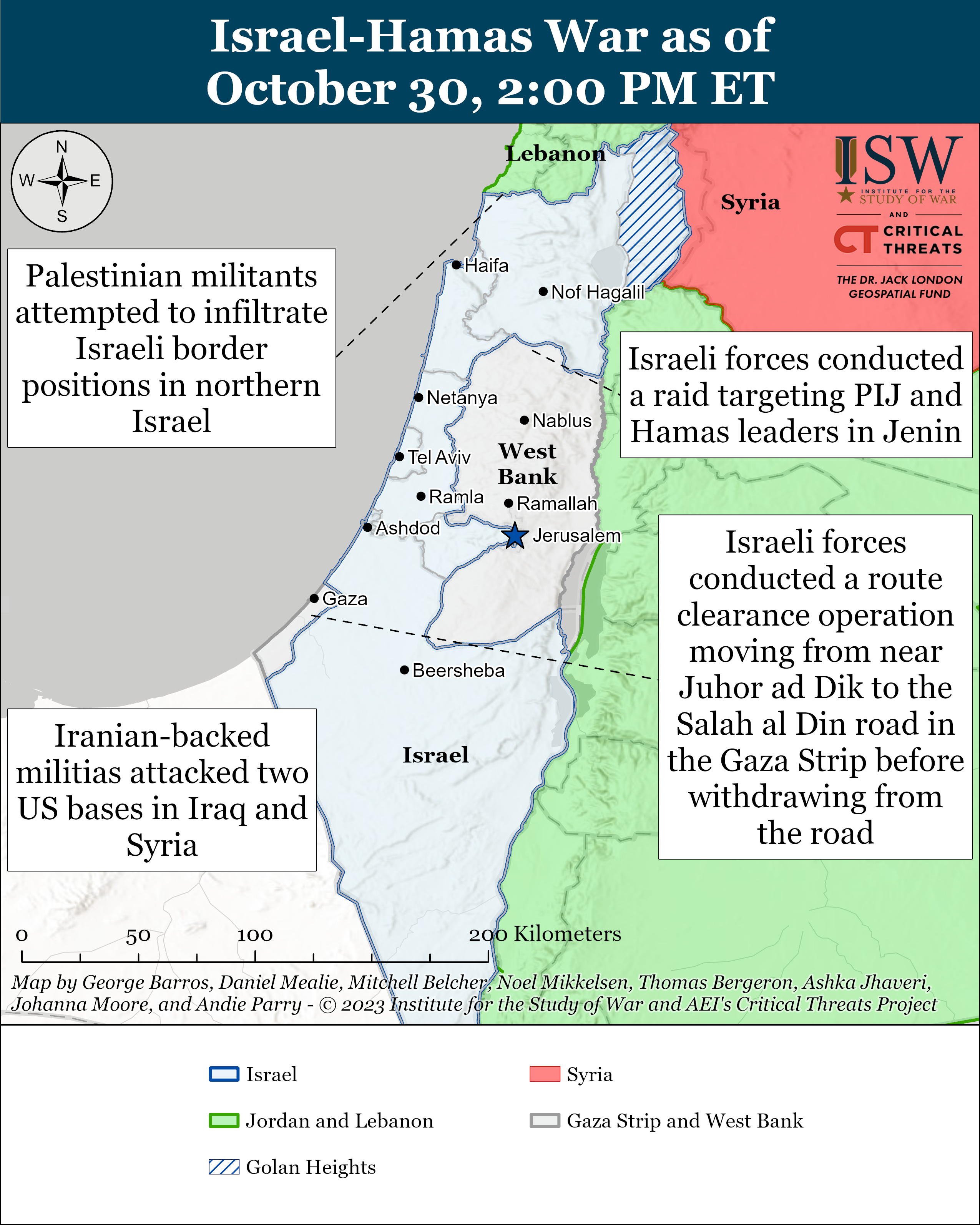
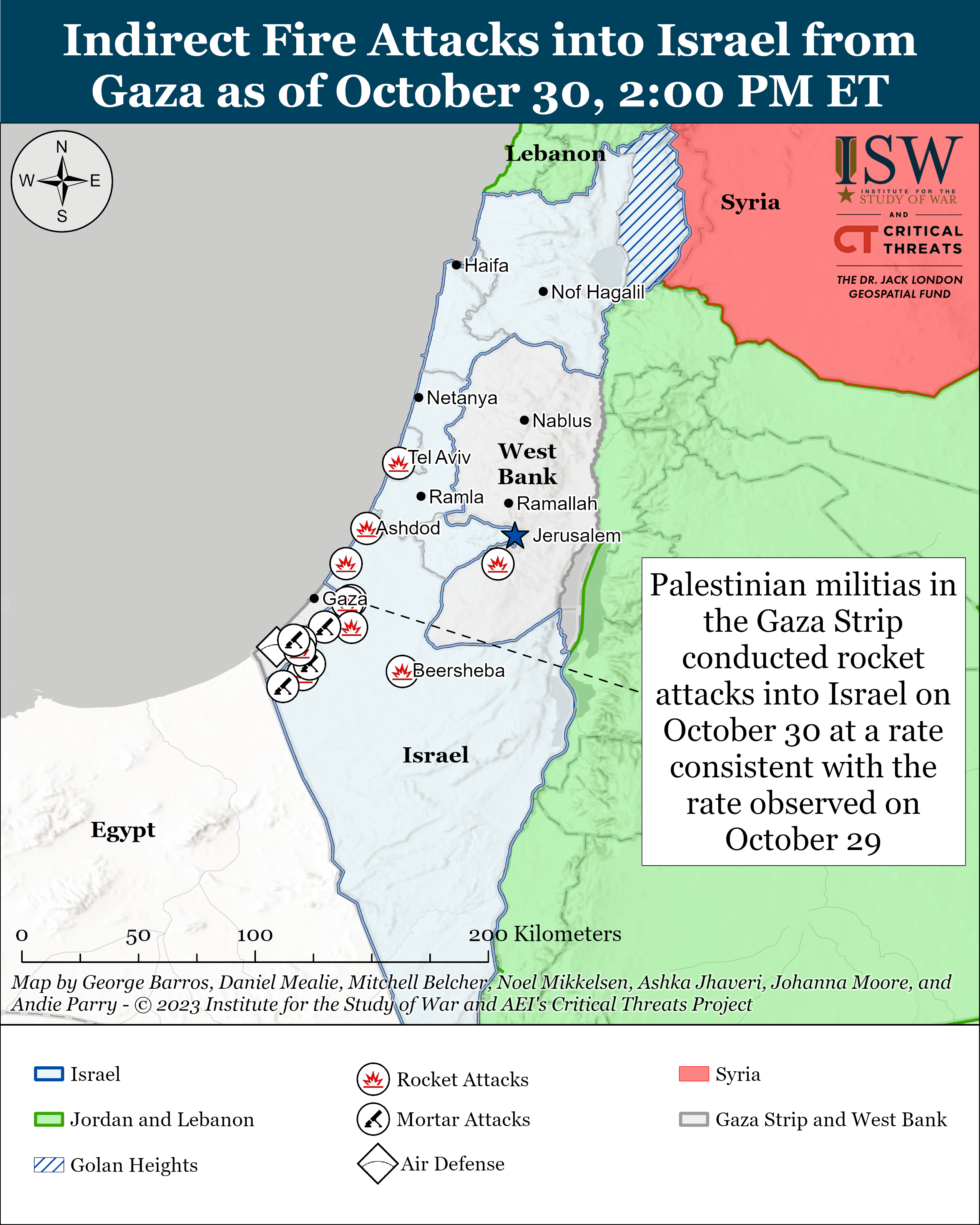
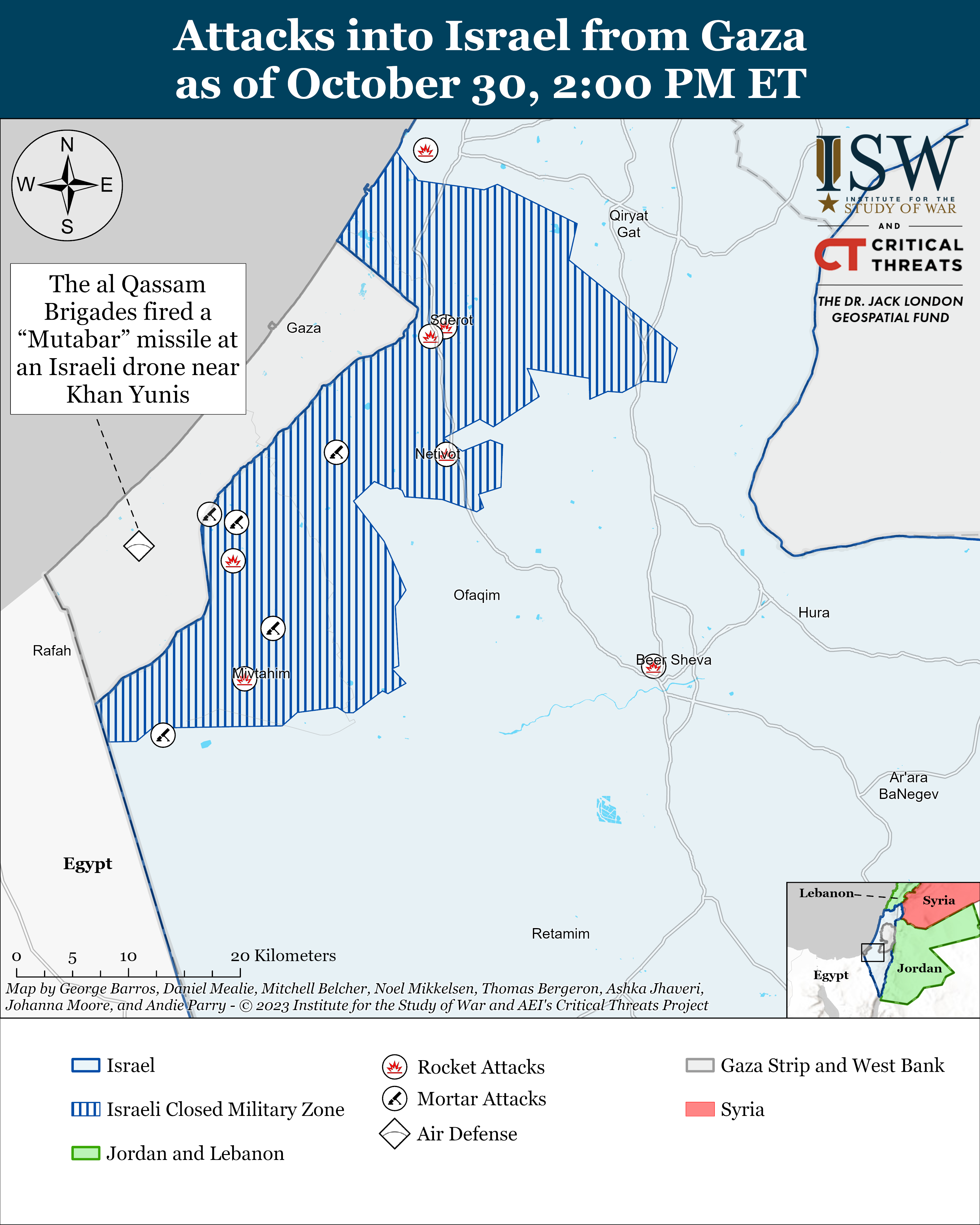
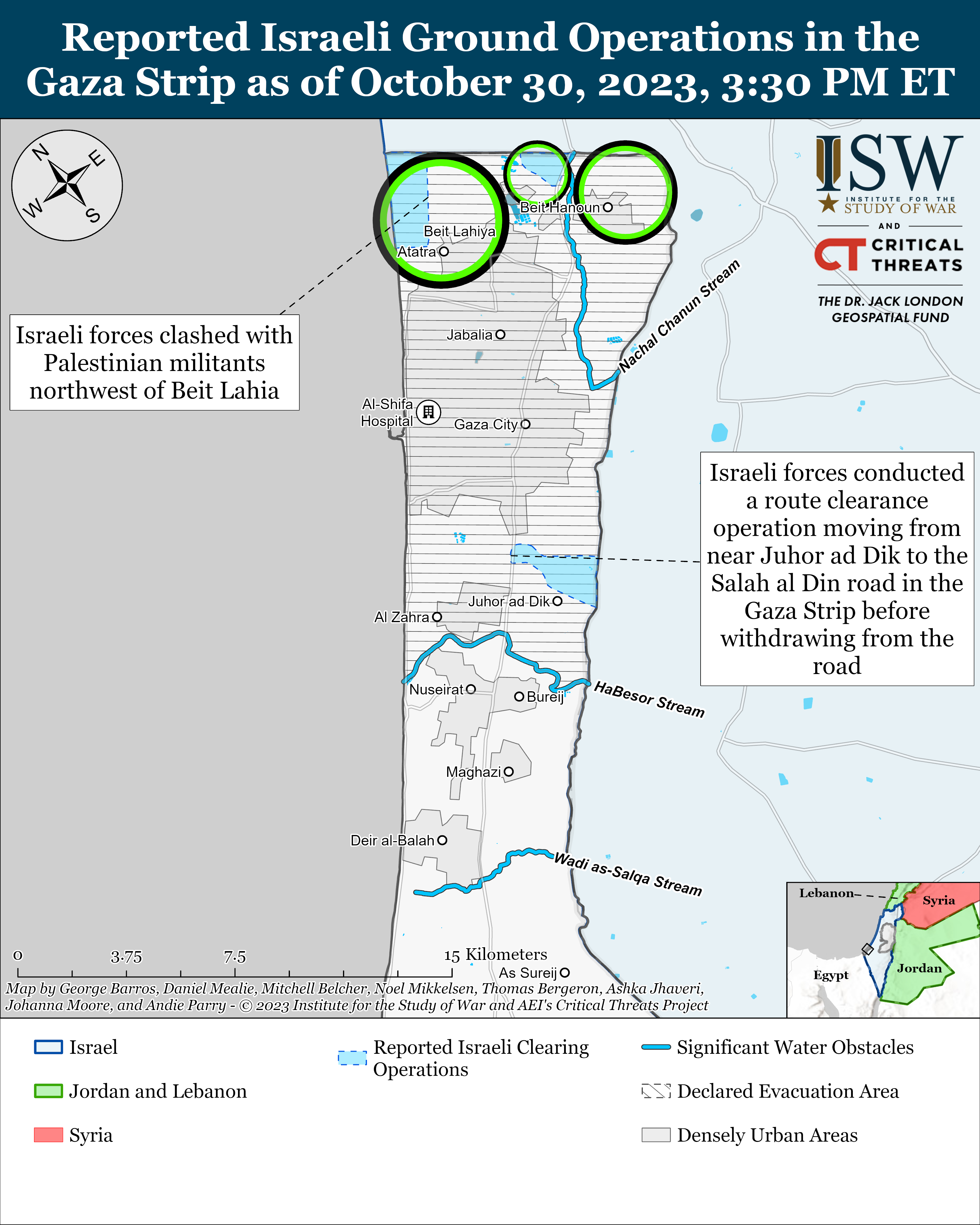
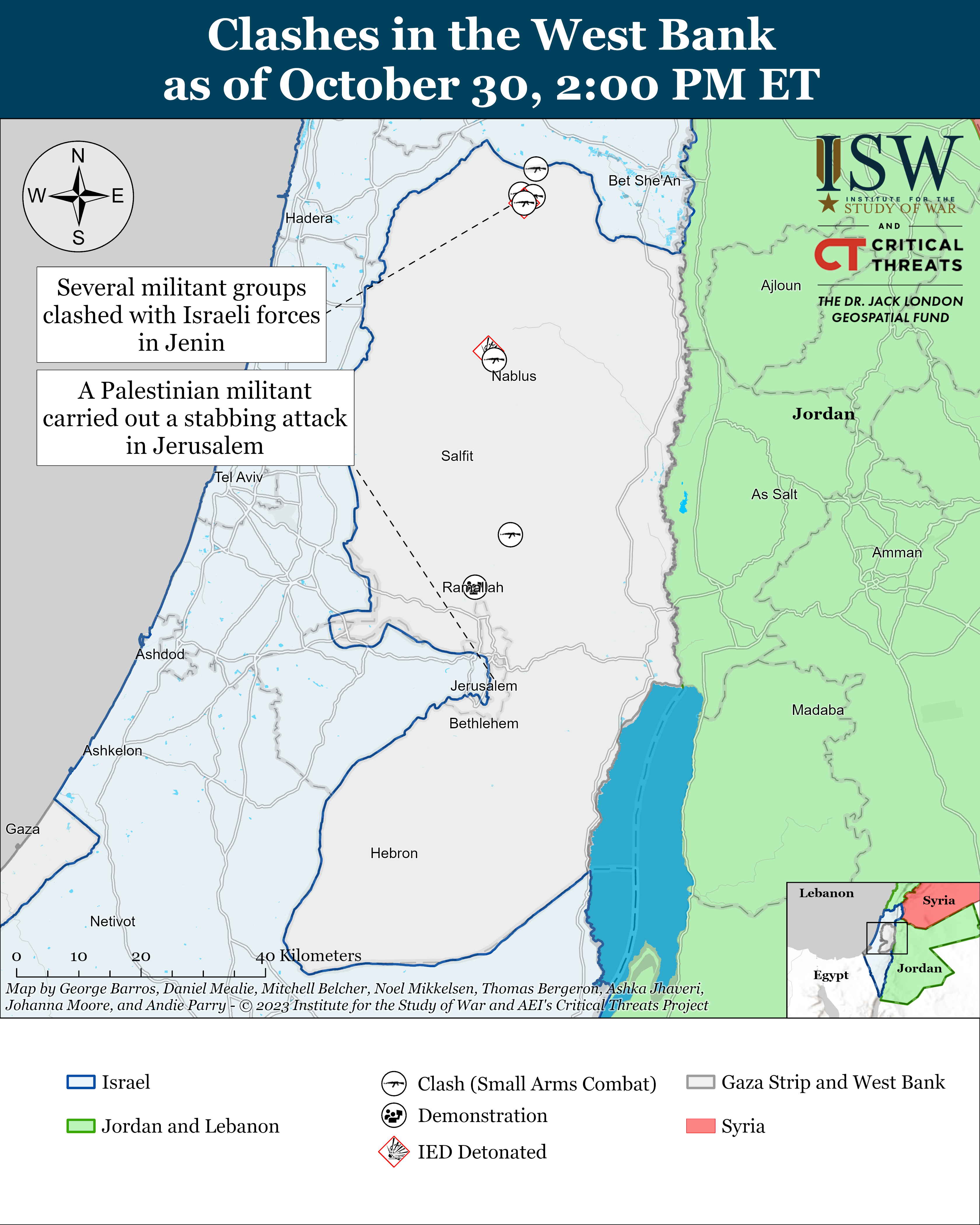
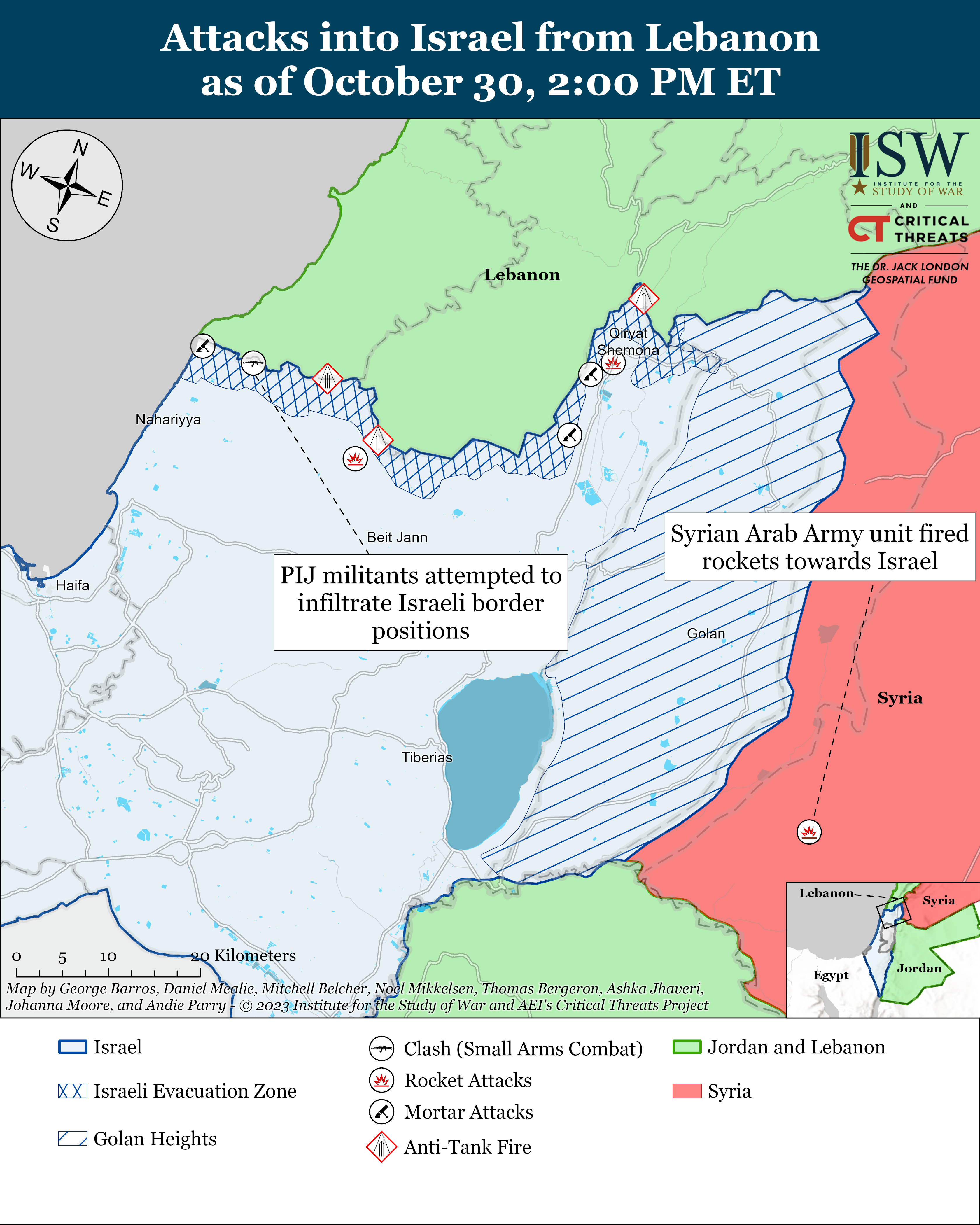
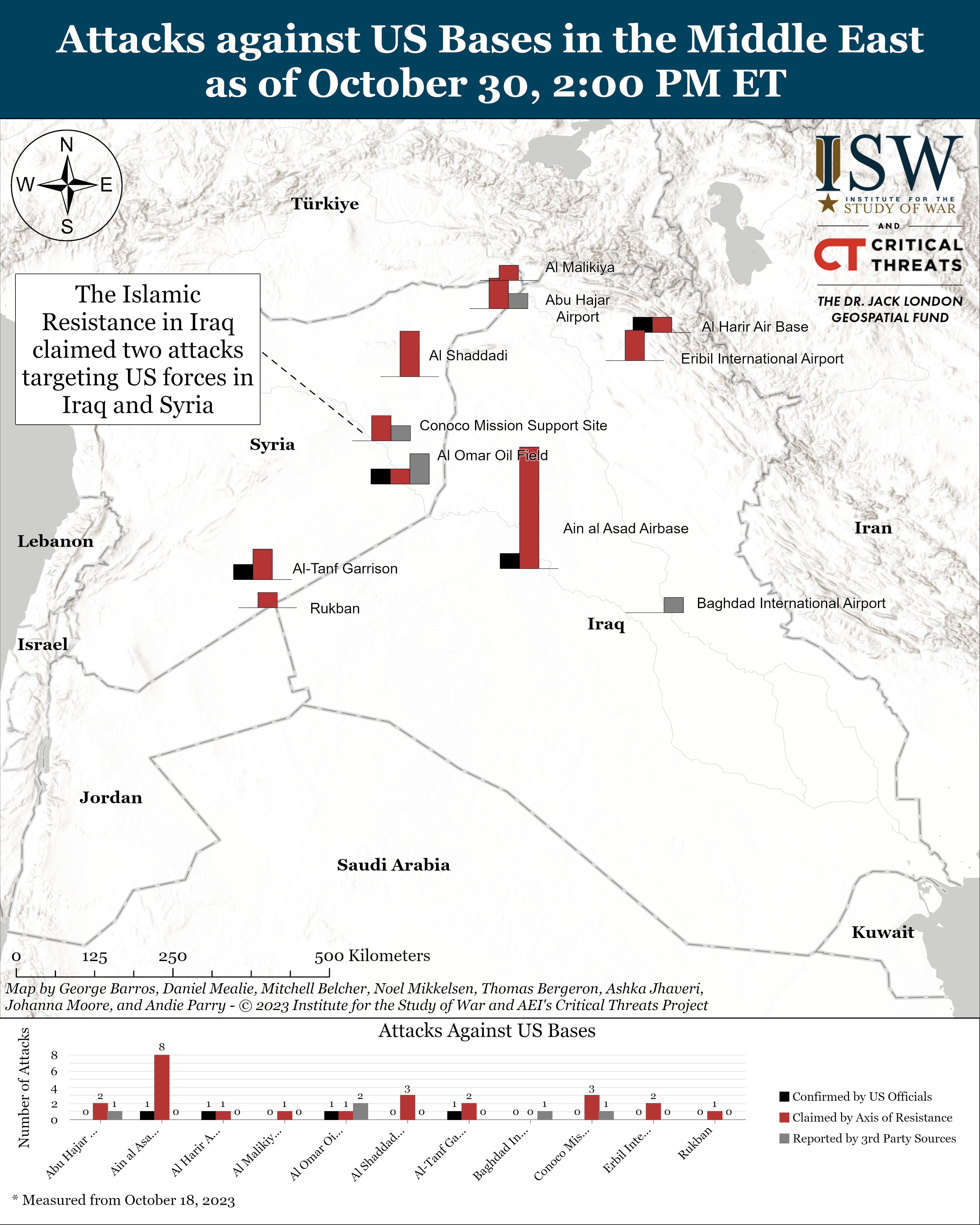
No comments:
Post a Comment